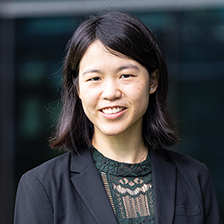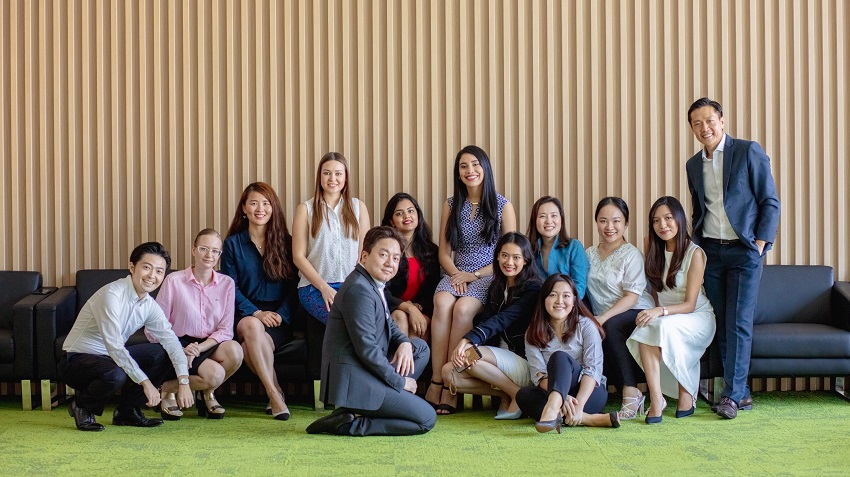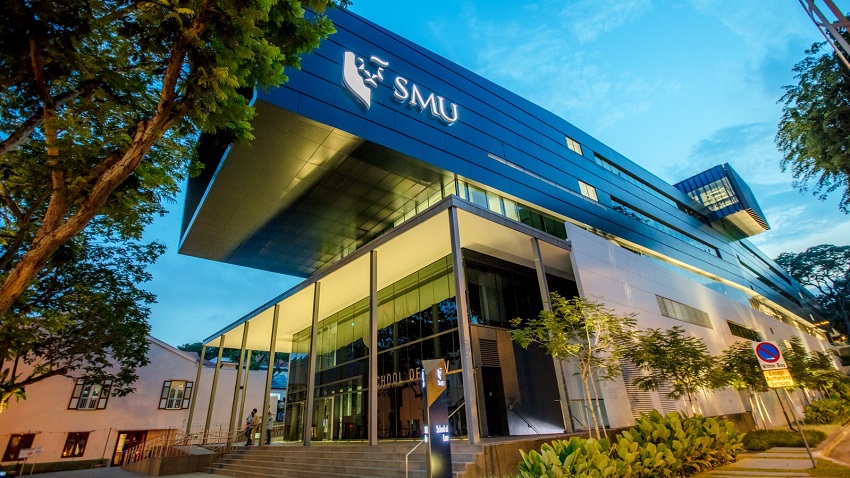-
36
Months Duration (Full-time Only)
-
S$79,570
Tuition fee (Inclusive of GST, for 2026 Intake)
-
APPLICATIONS OPEN
Deadline: 01 May 2026
* Only one intake in August every year
* Only full-time is available, no part-time
About the SMU Juris Doctor (J.D.) Programme
SMU Juris Doctor (J.D.) is a postgraduate degree for aspiring practitioners of law. This robust programme will comprehensively expose students to interdisciplinary and applied practices in the legal landscape. It's a 3-year full-time programme including totally 25 credit units. Through the core modules and rich electives of the JD programme, students can not only build a solid foundation of law, but also improve critical thinking, professional judgements and soft skills. All core modules are taught in classes exclusively for JD students only.
SMU JD students have a diverse background, promoting a rich exchange of study and work experience. The SMU JD programme will allow graduates to take the Singapore Bar Exam if they attain a GPA of at least 3.0. During the JD programme, students can also choose to complete another MBA degree, Dual-JD or JD-LLM programme with partner universities.
SMU LLM alumni may complete the JD programme in two years if apply for the SMU JD within 3 years of graduation.
Why pursue the SMU J.D.?
-
1
Graduate of any discipline is eligible
A full-time law degree for graduates of any discipline. Non-law graduates are welcomed to apply.
-
2
Exclusive basis
All core law modules are taught in classes exclusively for JD students only.
-
3
Diverse Student Background
JD students hail from different disciplines and work experiences, thus promoting a rich exchange of diverse perspectives.
-
4
Qualifying Law Degree
With a GPA of ≥ 3.0 points, graduates can take the Singapore Bar exam.
-
5
Choice to value-add to your JD degree
Students can choose to complete the SMU MBA degree, the Dual JD Programme with Yonsei University, or the JD-LLM Programme with Bocconi University.
-
6
3 Tracks Available
Building upon the multiple and interdisciplinary nature, a track will benefit students from greater disciplinary knowledge, industry awareness and practical skills.
Class Profile
-
 Gender
Gender1 : 1
-
 Typical Age Range
Typical Age Range21-58
-
 Average Age
Average Age30
-
 Average Years of Work Experiences
Average Years of Work Experiences4.6
Our global network

Singapore
China
South Korea
Japan
United States of America
India
Malaysia
Singapore
China
South Korea
Japan
United States of America
India
Malaysia

Testimonials

Programme Details
Programme Structure
With effect from the 2022 admission cohort, the programme structure is revised as such:
| Law Core (17.0 course units) |
+ | Law Electives (8.0 course units) |
| Internship and Pro Bono Service | ||
The curriculum is designed to be completed in 3 years but the programme may be accelerated in some cases for completion within 2 years subject to the approval of the J.D. Committee, which will take into consideration their first term's exam grades.
In order to graduate, students are also required to undertake 6 weeks of internship and clock 20 hours of Pro Bono service.
Illustrative 3-year Programme (cu = course unit):
(Core modules have to be done in the year and term stated. Approval is required for any deferrals to Year 2 core modules).
| YEAR 1 | YEAR 2 | YEAR 3 | |
|
Term 1: Aug - Dec |
Contract Law 1 |
Law of Business Organisation (1.5cus) |
Legal Theory and Philosophy |
|
(15 weeks) |
Criminal Law (1.25cu) |
Law of Property (1.25cu) |
Commercial Conflict of Laws |
|
|
Legal Research Writing |
Law Elective 2 |
Capstone Project |
|
|
Singapore Legal System (0.5cu) |
Law Elective 3 (0.5cu) |
Law Elective 6 |
|
|
December Break |
||
|
Term 2: Jan - Apr |
Contract Law 2 |
Constitutional and Admin Law (1.5cu) |
Law of Evidence |
|
(15 weeks) |
Law of Torts (1.5cu) |
Law of Equity and Trust (1.5cu) |
Laws Elective 7 |
|
|
Legal Research Writing II (0.5cu) |
Law Elective 4 |
Law Elective 8 |
|
|
Comparative Legal Systems (0.5cu) |
|
|
|
|
|
|
|
|
Summer Term 3A: May - Jun (5 weeks) |
Law Elective 1 |
Law Elective 5 |
|
|
Summer Term 3B: Jun - Jul (5 weeks) |
Internship (6 weeks) |
||
|
Summer Break: Jul - Aug (4 weeks) |
Pro Bono (20 hours) |
||
With effect from the 2021 admission cohort, the programme structure is revised as such:
| Law Core (17.5 course units) |
+ | Law Electives (7.5 course units) |
| Internship and Pro Bono Service | ||
The curriculum is designed to be completed in 3 years but the programme may be accelerated in some cases for completion within 2 years subject to the approval of the J.D. Committee, which will take into consideration their first term's exam grades.
In order to graduate, students are also required to undertake 6 weeks of internship and clock 20 hours of Pro Bono service.
Illustrative 3-year Programme (cu = course unit):
(Core modules have to be done in the year and term stated. Approval is required for any deferrals to Year 2 core modules).
| YEAR 1 | YEAR 2 | YEAR 3 | |
|
Term 1: Aug - Dec |
Contract Law 1 |
Law of Business Organisation (1.5cus) |
Legal Theory and Philosophy |
|
(15 weeks) |
Criminal Law (1.25cu) |
Law of Property (1.25cu) |
Commercial Conflict of Laws |
|
|
Legal Research Writing |
Law Elective 2 |
Capstone Project |
|
|
Singapore Legal System (0.5cu) |
Law Elective 3 (0.5cu) |
Law Elective 6 |
|
|
December Break |
||
|
Term 2: Jan - Apr |
Contract Law 2 |
Constitutional and Admin Law (1.5cu) |
Law of Evidence |
|
(15 weeks) |
Law of Torts (1.5cu) |
Law of Equity and Trust (1.5cu) |
Laws Elective 7 |
|
|
Legal Research Writing II (0.5cu) |
Law Elective 4 |
Law Elective 8 |
|
|
Comparative Legal Systems (0.5cu) |
|
|
|
|
|
|
|
|
Summer Term 3A: May - Jun (5 weeks) |
Law Elective 1 |
Law Elective 5 |
|
|
Summer Term 3B: Jun - Jul (5 weeks) |
Internship (6 weeks) |
||
|
Summer Break: Jul - Aug (4 weeks) |
Pro Bono (20 hours) |
||
| Law Core (18.5 course units) |
+ | Law Electives (6.5 course units) |
| Internship and Pro Bono Service | ||
The curriculum is designed to be completed in 3 years but the programme may be accelerated in some cases for completion within 2 years subject to the approval of the J.D. Committee, which will take into consideration their first term's exam grades.
In order to graduate, students are also required to undertake 6 weeks of internship and clock 20 hours of Pro Bono service.
Illustrative 3-year Programme (cu = course unit):
(Core modules have to be done in the year and term stated. Approval is required for any deferrals to Year 2 core modules).
| YEAR 1 | YEAR 2 | YEAR 3 | |
|
Term 1: Aug - Dec |
Contract Law 1 |
Corporate Law |
Legal Theory and Philosophy |
|
(15 weeks) |
Criminal Law (1.25cu) |
Law of Property (1.25cu) |
Commercial Conflict of Laws |
|
|
Legal Research Writing |
Constitutional and Admin Law (1.5cu) |
Law Elective 3 |
|
|
Singapore Legal System (0.5cu) |
Ethics and Social Responsibility for Law |
Law Elective 4 (0.5cu) |
|
|
December Break |
||
|
Term 2: Jan - Apr |
Contract Law 2 |
Comparative Legal Systems |
Law Elective 5 |
|
(15 weeks) |
Law of Torts (1.5cu) |
Law of Equity and Trust (1.5cu) |
Law Elective 6 |
|
|
Law of Business Organisation |
Law of Evidence |
Law Elective 7 |
|
|
Legal Research Writing II (0.5cu) |
|
|
|
|
|
|
|
|
Summer Term 3A: May - Jun (5 weeks) |
Law Elective 1 |
Law Elective 2 |
|
|
Summer Term 3B: Jun - Jul (5 weeks) |
Internship (6 weeks) |
||
|
Summer Break: Jul - Aug (4 weeks) |
Pro Bono (20 hours) |
||
Programme Information
- Law Core Courses
- List of Law Electives
- Pro Bono Service
- SMU-Yonsei J D Dual Degree Programme
- SMU JD-MBA Advance Placement
A J.D. student is required to complete a total of 25 course units (cus) of law courses. The cu of each core course will vary from 0.5 cu to 1.5 cus. A student will complete an average of 8 cus of core course in 1 year. No core course can be deferred in Year 1. Approval is required to defer any Year 2 core modules to Year 3. Students are only allowed to commence their 6 week legal internship, 20 hours of pro bono work and choose their electives after completing all Year 1 core courses.
This course provides an overview of the fundamental principles and methodologies of the conflict of laws (also known as private international law), with focus on their application in commercial transactions. Cross-border commercial transactions are the norm in a modern globalised era. The conflict of laws addresses three large questions: (1) In which country should the case be tried? (2) Which country's law should be applied to resolve the dispute? (3) What should be the legal effect in one country of a judgement given in another? From the perspective of Singapore law, the questions translate into: (1) When would or should a Singapore court hear the case (and sometimes try to stop it from being heard in another country)? (2) Which country's law would or should the Singapore court apply to resolve the issue before it? and (3) What legal effect would or should a foreign judgement have in Singapore ? This is a course on Singapore conflict of laws, but comparisons will be made from time to time to the laws of other countries.
The overall objective of the course is not to teach the laws of specific jurisdictions but rather to provide you with a macro perspective of how legal traditions (and systems) function so as to equip you with a conceptual understanding of the commonalities and differences of the various systems. This course will examine the various legal cultures and traditions within Asia, using the European and, to some extent, the US experience as a backdrop. The indigenous and historical background of legal development in Asia, including the Western and colonialist (and post-colonialist) influences will be explored from a number of different angles, with a view to providing you with an enhanced comparative “perspective”. Specifically, the course will cover topics including an introduction to comparative legal systems, Asian legal systems and their historic background, civil law tradition, common law tradition, mixed legal systems, legal pluralism, globalisation and regionalisation and dispute resolution in Asia.
This course introduces the principles of constitutional law and administrative law. Constitutional law is concerned with the organisation of the state, and the inter-relationship between the government, civil society and the individual. Administrative law is about the governance of public bodies exercising statutory or other powers or performing public duties. In this regard, we are generally concerned with how law, institutions and norms promote good governance, how political power and public law functions are legitimated, how abuses of public power are prevented or remedied, and the relationship between the individual and the state.
Contracts are the foundation of commercial life. This course aims to equip students with a firm appreciation of the unique character of contracts as a form of voluntary undertakings. This course begins by examining the concepts relating to the formation of a contract, as well as how an otherwise validly formed contract may have its effect nullified by issues such as misrepresentation, duress, undue influence, etc.
This course follows on from LAW101 - CONTRACT LAW 1 in which you will have been introduced to some of the foundational topics in contract. In LAW102 - CONTRACT LAW 2, we will complete our survey of these foundational topics, and focus on the detailed application of these rules, and how they have been statutorily modified in relation to one particular category of contracts, namely, contracts for the sale of goods.
This course continues the consideration of company law from where Law201 Business Organisations left off. In addition, as you would by now understand the concept of separate legal personality, LAW 205 will consider the Limited Liability Partnership, a hybrid vehicle introduced to widen the menu of available business vehicles, as well as the Business Trust.
This course will introduce you to the fundamental principles of criminal liability in Singapore. Criminal law will first be examined from a jurisprudential view point with a study of its aims and objectives and the purpose of crime control and punishment in society. You will study the major offences (against the person and property) and general defences under the Penal Code and some selected statutes. Legislative provisions, judicial decisions interpreting these provisions and proposals for reform of the law, both in Singapore and elsewhere, will be closely examined. In addition, you will learn about the Singapore criminal process and how a person accused of a crime is investigated, tried in court and, if found guilty, convicted and sentenced within our criminal justice system.
Issues of ethics and social responsibility arise frequently in our professional and personal lives. The failure to recognise and deal effectively with these issues can have serious implications for individuals, companies, governments and society. The violation of some fundamental ethical rule has been the cause of almost every major corporate scandal in the world. One major challenge is recognising issues of ethics and social responsibility when they arise. Another challenge is to understand why and how individuals, companies and governments get themselves into ethical difficulties and how and why companies fail in being “socially responsible”. A third challenge is figuring out how to resolve ethical challenges and dilemmas as they arise: what is the right thing to do? You will examine, through cases, problems, seminar discussions and readings, issues of ethics and social responsibility that arise in real-life contexts and decide what principles to apply to an ethical problem and what you would do in that situation.
Singapore law recognises that there are many ways one can organise commercial activities with a view to maximising operational efficiency and minimising exposure to personal risk. These diverse mechanisms, ranging from agency, sole proprietorships, partnerships, bodies corporate and others, form the core of the content of this course (LAW 201) and of LAW 205 Corporate Law (to be taught in semester 2). LAW 201 will focus on sole proprietorships, partnerships (including the proposed limited partnership) and part of company law. LAW 205 will cover the remainder of company law as well as limited liability partnerships (LLPs), business trusts and miscellaneous business vehicles.
The objective of this course is to introduce you to the jurisdiction and principles of equity. To acquire a fundamental understanding of the subject, it is necessary to consider the history of equity and its evolution to the present day. In this course, the law of trusts will be examined in depth. The trust is considered the most significant contribution by equity and is applied in various areas of daily life. Through the study of the course, you will come to appreciate the interrelationship of the different areas (e.g. the law of property, the law of unjust enrichment) of the law. The ability to view the law holistically is important for practice where complex legal problems are not presented in pre-identified contexts. Materials from other Commonwealth jurisdictions will also be drawn upon for comparative purposes.
The Law of Evidence is primarily concerned with the Evidence Act's conceptualisation of relevance and admissibility of evidence in Singapore. "Exclusionary" rules such as hearsay, similar fact and expert opinion will be explored. Other topics include standard and burden of proof, privilege and statements. The relationship between the Evidence Act and the common law, as well as certain features of Singapore's justice system, are key themes.
This course aims to introduce you to the basic principles of common law and equity as applied to property, both immoveable and moveable, including intellectual property. Beginning with an exploration of what ownership of land means, this course will consider how land can be dealt with at common law and in equity, before taking a look at how some of these complexities have receded, given the adoption and universal application of the Torrens registration system in Singapore. The question of ownership and transfer of moveable property at common law and equity will then be considered, with particular attention to the difficulties posed by intangible moveable property in the form of intellectual property rights, as well as other choses in action. Finally the course will examine the creation of security interests over immoveable and moveable property and the problems relating to determining the priorities of competing security interests.
This course will examine general principles of tort law and a selected number of torts at greater depth. The goals and objectives of tort law will be examined in the context of the relationship between torts, contract and criminal law and property law. The course will emphasise the different range of interests to be protected by tort law (such as proprietary, economic and personal interests) as well as the mental element and conduct with respect to the alleged tortfeasor (intentional, recklessness, carelessness and strict liability). The significance of consequential harm and torts actionable per se will also be discussed. The course will illustrate the dynamic nature of tort law to meet changing social and economic conditions.
This course builds on the basic legal skills of case analysis and statutory interpretation taught in Legal System, Legal Method & Analysis in Term 1. The main objective of this course is to develop practical skills in legal analysis, research, writing and advocacy in first-year law students. Drafting, interviewing and mediation skills will also be touched upon. The above skills will be taught in the context of legal problems in contract law, criminal law and/or tort law. The first half of the course focuses on predictive/objective writing and the basics of legal research (including how to find and use primary and secondary legal sources). The second half of the course focuses on persuasive writing, culminating in a moot court exercise. By the end of the course, you should have acquired the following fundamental skills:
- Ability to analyse facts and identify legal issues
- Ability to find the applicable law (whether caselaw or statute), using print and electronic legal research tools/resources
- Ability to analyse how that law applies to the facts in the case so as to ascertain the parties' rights, obligations and options
- Ability to communicate the foregoing effectively, in writing and orally, to different audiences (e.g. client, law firm partner, court)
Singapore belongs to the common law tradition, given its English colonial heritage. Many aspects of the legal system are thus derived from the English system. It is important to realise, though, that Singapore’s legal system and that of its constituent laws are not mere offshoots of the English. Many substantive and institutional features, as well as rules and practices within the system, have changed over time. Broadly speaking, topics include Singapore’s legal history, the sources of law in Singapore, constitutional and institutional framework of the Singapore State and disruptions to and the regulation of the legal sector. Circumstances permitting, a trip to a State institution may be organised.
The main objectives of the course are, firstly, to familiarise you with the various key aspects of the Singapore legal system; and, secondly, to equip you with fundamental legal knowledge to springboard to other courses within the core curriculum.
Law, in its various forms, has an ideology, and sometimes many different ideologies. Legal Theory and Philosophy - part of the core curriculum - is intended to provide you with a foundation so as to enable you to evaluate the many different ideologies that permeate the law. Many of these questions are generally considered to be devoid of practical relevance. Part of the effort in this course is to demonstrate why such philosophical queries are not meaningless, but intimately connected with the everyday practice and performance of the law.
The praxis of law is literally impossible without the many assumptions - of values, utility and purpose - it works with. A course on Legal Theory must necessarily invite you to explore these assumptions and the forces that allow its practical transformation. How does society internalise these assumptions? Who benefits from these assumptions? Who are marginalised by these assumptions? And finally, in what ways does law draw from other social institutions in hardening these assumptions into "social reality"?
But beyond these evaluative tasks, a course on Legal Theory must also contend with the "normative." Are alternative assumptions possible? What would an alternative characterisation of law look like? Whose interests must trump in the alternative appraisal of the law? Do some individuals or groups of individuals have more intimate claims to the promise of law? If so, on what basis should we prioritise these claims?
In developing these questions, the course will draw upon traditional categories of philosophical analysis including schools of natural law, positivism, realist approaches to the law, Marxist approaches to the law, etc. Additionally, it will introduce you to theories of morality (utilitarianism, deontology, etc.) and justice (Aristotle, Rawls, Nozick, etc).
The objective of this course is to introduce students to the art of advocacy and court craft, as it is practised in Singapore. It will be practice-oriented and skills-based. The course will consists of 10 weeks of seminars and 6 practice sessions by lawyers, including SCs from 2 leading law firms. They will cover specific areas such as development of case theory, opening statements, cross-examination techniques and closing submissions. This will give the students real insight into the actual workings of litigation practice in Singapore and an opportunity to interact with and be inspired by the very best litigators in town through the practice sessions. The practice sessions will be a series of 4 “learn-by-doing” workshops, where the students will be asked to perform various advocacy tasks using a case study in a simulated court room environment. The seminars will focus on the following areas:
- Development of case theory
- Pleadings
- Preparing for trial
- Drafting Opening Statements
- Drafting Affidavits Examination-in-chief
- Learning Cross-examination and Re-examination
- Drafting Closing Submissions
- Ethics and Etiquette
This will give students a hands-on opportunity to practice trial techniques and strategies with the assistance of experienced and skilled trainers, who will offer constructive and practical suggestions in a supportive learning environment. Students will develop essential advocacy skills, including effective preparation and communication skills, and develop their own effective style of advocacy.
Financialisation has become an important phenomenon in mature and developing economies worldwide, and the globalisation of the financial sector has spurred developments in international banking and financial regulation. The regulation of banks and financial institutions in the intermediation of global money looks set to increase in importance at the national, regional (such as the EU) and international levels. The course aims to provide students with an inter-disciplinary and up-to-date overview of the contemporary developments in financial regulation internationally and in key jurisdictions, such as the US and UK.
The objective of this course is to introduce students to the art of appellate advocacy and court craft as is practised in Singapore. It will be practice-oriented and skills-based. The course will consist of 4 classroom seminars, and 2-3 practical sessions before lawyers from Allen & Gledhill LLP. The course will cover the substantive and procedural law specific to appeals (including appeals from the High Court to the Court of Appeal, from the Subordinate Courts to the High Court or within the High Court, i.e. appeal from registrar to judge). It will also focus on the drafting skills specific to appeals as such the drafting of the appellant’s case, respondent’s case or further arguments, as well as the techniques relevant to appeals such as oral advocacy. The practical sessions will involve students being asked to draft appellant’s case, respondent’s case and to conduct at least 2 appellate moots (both as appellant and respondent) in a stimulated court room environment.
The course seeks to provide students a hands-on opportunity to practice appellate techniques and strategies with the assistance of experienced and skilled trainees who will offer constructive and practice suggestions in a supportive and learning environment.
The law and regulation of banking is a topic of fundamental importance in market economies. Banks as providers of deposit and savings accounts, personal and business finance and payment mechanisms, are crucial to all sectors of commerce, and their distinctive role is recognised by their special regulatory treatment.
This course will introduce the regulatory environment for banking transactions, examining the reasons why banks are singled out for special treatment, and the roles of banking regulators and central banks. Consideration will be given to systemic risk, and the response by way of prudential regulation, including capital and liquidity requirements. The modern focus on conduct of business regulation measures will be introduced. These topics will be discussed in the light of the international financial crisis of 2007-8, as well as previous regulatory failures.
The course will then examine the traditional banker customer relationship, with its background in familiar private law techniques. The traditional payment mechanisms of bills of exchange and letters of credit will be analysed, before turning to more modern payment mechanisms and systems. Lastly, there will be consideration of banks’ roles in modern financing techniques, including securitisation.
International trade is of growing importance to most economies and is a critical part of the Singapore economy. Trade often involves contracts for the sale of goods and commercial lawyers should be familiar with the law of sales and with how it varies from place to place and from the basic common law of contracts. The course compares and contrasts the UN Convention on the International Sale of Goods, the Singapore law, the Uniform Commercial Code, and the common law in the treatment of sales transactions. There are references to the UNIDROIT Principles of International Commercial Transactions. The course is problem oriented, and the problems are based upon real cases or disputes. Students are expected to participate in classroom discussions of the problems and other materials. Learning outcomes: (i) increased understanding of differing legal regimes and how they may be applied to common problems; (ii) further development of analytic skills and comparative understanding; (iii) increased skills in identifying relevant legal issues within complex fact situations; (iv) development of skills in close statutory analysis.
The course will cover the Competition Law of Singapore and the major regulations, guidelines, and decisions published by the Competition Commission of Singapore. In addition, the course will compare the Singapore Competition Law with the laws in effect in the United Kingdom, the European Union, and the United States. Coverage of the competition laws of other jurisdictions will not be comprehensive, but the coverage will be enough to provide students with a basic understanding of comparative approaches. The course will consider the economic rationale for regulation of competition, the definitions of relevant markets, improper horizontal agreements, vertical restraints of trade, mergers, justifications for agreements or consolidations that might otherwise run afoul of the law, and enforcement mechanisms.
The intention will be to examine the theory and practice, with more attention on the latter, of cross-border litigation. The difference between it and a more ordinary course on international commercial litigation (or between it and the ICL component of a course on the commercial conflict of laws) is that it will try to examine the practical consequences of the rules and the strategic opportunities which are available. The intention will be to take a complex case - maybe accountant or auditor negligence, maybe engineering disaster or pharmaceutical catastrophe - and look at the way it may evolve when the various interested parties (or their insurers) have divergent views about what litigation should take place, where it should take place, what may be done to stymie litigation in other places, and so forth: it will therefore examine law, procedure, and tactics. It will in part be done by reference to pleadings and skeleton arguments which will be drafted specially for the purpose. In the first year of its being offered, the course will be available only to final-year students who have completed the course on Commercial Conflict of Laws.
Singapore is a hive of construction activity – high rise offices, hotels, and residences; highways and the MRT. The work is factually and legally complex and gives rise to many disputes. The course will consider the development of contract and tort law which has been promoted by these disputes, contracts; sub-contracts; sub-sub contracts – the position of architects, engineers and surveyors. The effect of delay and defective work and the impact of changes of plan.
This course will examine the lawyer’s role in practice in the process of negotiating and drafting contracts. It will start with a re examination of the rules by which Courts decide whether there is a contract, particularly in lengthy and complex negotiations. It will then consider how the Courts decide what the contract means.
The bulk of the course will then consider how the parties can most effectively negotiate towards agreement and how that agreement should be drafted so as to provide the desired results.
This course will provide students with knowledge of major business or corporate crimes. Students will learn to appreciate the delicate balance which needs to be maintained between sustaining robust corporate activities and ensuring corporate integrity and good governance through sufficient regulation.
Crimes are taking pace in the business or corporate world with greater frequency. Knowledge of such crimes is, therefore, becoming increasingly important for all professionals. This course will provide students with sufficient knowledge of the characteristics of major corporate crimes such as criminal breach of trust, company fraud, corruption, insider trading, cyber crime, money laundering and terrorist financing, the reasons for their occurrence and the work of the regulatory, investigating and prosecuting agencies. It will also examine the role of the State in regulating corporate behaviour and current methods of crime control including international initiatives.
Insolvency law is concerned with debtors who are unable to repay their debts. This course will consider the rules and processes which the law has developed to address this ever-present problem, with a focus on debtors which are companies. In particular it will cover, in more depth than in LAW205, the formal processes available in Singapore - receivership, schemes of arrangement, judicial management and liquidation (winding up). In those contexts, the substantive policies and principles of the law will be addressed - e.g., the pari passu principle, the concept of set-off, and the avoidance of suspect transactions entered in the run-up to insolvency. In addition, the course will consider informal debt restructurings (work-outs), and also introduce the issues and developing law relating to cross-border insolvencies. As well as providing a theoretical grounding in corporate insolvency principles, it is expected that aspects of the course will involve the participation of specialist insolvency lawyers from private practice, with the aim of providing a practical perspective.
Although the primary focus will be on corporate insolvency, comparison will be made with the procedures and rules applicable in the bankruptcy of individuals. It is likely that before or during the period of the course the Government will publish a draft Insolvency Bill combining and amending the rules applicable to both individual and corporate insolvency. If so, the course will take those proposals into account.
[Pre-requisite courses: LAW205 Corporate Law.]
A large portion of the Singapore economy depends upon trade in goods. Sales and purchases of “things”, such as automobiles, furniture, semi-conductor chips, medical devices, pharmaceutical products, petroleum products, agricultural products, and so on are covered by the law of sales. In Singapore sales law, which is part of contract law, is governed by the Singapore Sale of Goods Act (“SOGA”) which is essentially the same as the UK Sale of Goods Act. Sales of goods that cross national boundaries are presumed to be covered by the UN Convention on the International Sale of Goods (“CISG”) to which Singapore and almost 80 countries are parties.
This course will focus on cases and problems arising under SOGA or CISG, or both. There are interesting differences between the statutory treatment of sales and the basic common law of contracts, and a lawyer who works in the commercial area needs to be aware of those differences. Lawyers must advise clients about whether to choose to be governed by the CISG or to follow the “opt out” procedures of the CISG and have domestic law apply to a transaction.
The course also will take note of sales law issues that have arisen in several countries with which Singapore has major trading activities and which could affect Singaporean companies. Some attention will be paid to the UNIDROIT Principles of International Commercial Transactions, a set of principles that incorporate, in various ways, elements of the lex mercatoria, the customary law of international sales transactions.
The focus will be on practical problems that are common to international sales transactions and students will have the opportunity to work through various problems that are based on real cases.
This course will look in detail at the structuring and drafting of commercial agreements and ultimately, the interpretation of various clauses in these commercial agreements. Students will be taken through a variety of commercial agreements including agreements for the sale of goods, distribution agreements, agency agreements, employment/services agreements (such as consultancy agreements), licence/franchising agreements. Further, this course will introduce students to a number of corporate transactions and their relevant documents.
Precedent agreements will be used to illustrate how relevant clauses fit into each agreement as a whole and interrelate with other clauses. In addition, we will look at a selection of case law in order to explain why certain clauses are drafted in a particular way and the problems parties may face if they do not have a full understanding of how a court will interpret such clauses.
This skills-based, drafting-focused course aims to introduce students to the practical aspects of drafting of corporate transactional documents through a study of common corporate documents across selected areas of corporate practice, namely mergers and acquisitions, banking/financing and joint ventures. Students will learn the fundamentals of the review and drafting of such corporate documents. The course will also give the students an insight into legal risks that clients face and discuss options and strategies to manage such risks through effective drafting.
The economic analysis of law, or the law and economics movement, is one of the major theoretical perspectives in legal studies in the US, and has exerted a growing influence on legal thinking around the world. This course examines the role of economic principles in analyzing the law. It seeks to provide students with an understanding of the law based on microeconomic analysis. Under the economic approach to law, laws are viewed as providing incentives for influencing human behavior and as instruments for achieving policy objectives. We will explore the economic rationale underlying the primary rules of certain key areas of law, including, inter alia, those relating to property, contracts, and torts. The course also addresses criticisms of the economic approach to law, in particular, the redistributive approach to private law. Students are expect ed to learn the basic skills of applying cost-benefit analysis to law, and will be encouraged to apply this analytical method to the making of policy judgments with respect to law and regulations. This course is also aimed at enriching the economic and business sense of law students, which will add critical value to a career in law, either as a private practitioner or as an administrator in the public sector. Students will be encouraged throughout the course to reflect not only on what the law is, but also on what it should be.
This course covers non-Muslim family law in Singapore. Topics include the formation and termination of marriage, the legal and economic aspects of the husband-wife relationship, the legal and economic aspects of the parent-child relationship, and foreign marriage laws.
This course aims to give students a practical overview of the principles and statutory regime relating to the regulation of securities in Singapore. Where relevant, comparisons will be made with other jurisdictions such as the United States, United Kingdom, Australia and Hong Kong. Topics to be covered include the capital markets and the regulatory authorities, the pre-listing and the listing process for securities, continuing listing obligations and delisting from the stock exchange.
The proliferation of bilateral investment treaties (BITs) and free trade agreements (FTAs) containing investment protection chapters is responsible for the rapidly expanding and changing field of foreign direct investment law. What was once an esoteric part of public international law that dealt with direct expropriation and compensation standards has now developed into a sophisticated body of complex rules that are applied in investor-state disputes by international tribunals. The course will consist of a systematic examination of key principles and policies of foreign direct investment law, a close study of the several obligations undertaken by host state in its treatment of foreign investors, a critical examination of the compensation standards that have been developed by international tribunals, and the settlement of disputes under various investment protection agreements. The materials that will be analyzed in the course will be the BITs and the investment protection chapters in the FTAs concluded by Singapore, a few principal model BITs issued by countries such as the US, some typical foreign investment protection laws of some ASEAN countries and the decisional law of investment dispute tribunals such as the International Centre for the Settlement of Investment Disputes (ICSID).
Information Technology is the use of technology to manage and process information. It involves the development and use of computer hardware and software for every aspect of the 'life' of information, goods and services as well as the 'process' of communication. As technology develops and changes, new challenges emerge for law and policy-makers to deal with the impact that they may have on society. Existing laws have to adapt to the digital medium and subject matter, and in some cases entirely new areas of law are crafted. This course on Information Technology and the Law examines the legal issues and regulations arising out of the use of information technology in major areas of law, such as electronic contracting in e-commerce, intellectual property rights on the Internet, the domain name regime, data protection and privacy rights in relation to electronic information, torts committed online, content regulation, computer crimes and cybercrime.
The objective of this course is to understand laws regarding insurance contract, insurance companies and the insurance market. Insurance is an integral part of people’s daily life and insurance companies are important participants in the financial market. The purposes of this course are two-folds: (1) this course will introduce certain special rules regarding insurance contracts (based on the general contract law), e.g. insurable interests and duty of utmost good faith; and (2) this course will introduce the regulation of insurance companies and insurance agents. After this course, students should be able to make arguments regarding insurance policies on behalf of an insured or an insurance company and to identify regulatory issues regarding the operation and risk management of insurance business. The course will primarily focus on Singapore law; but comparisons will be made from time to time to the laws of other countries.
The economic significance of Asian economies already speaks for itself. However, attention to its intellectual assets and law is simply lacking. The course sets to promote Asian awareness among Asian economies in the area of IP assets and the law. It aims to make students ask “why Asian IP assets and law?”, “what is special about Asian IP assets and law?”. Given the vast geographic coverage and developmental discrepancy in Asia, this course can only strive to look into patent, trademark, and copyright law in China, India, Japan and Taiwan. That said, this course will still dig out intellectual assets and law in other jurisdiction which exhibit features and uniqueness seldom seen elsewhere. In addition, this course will also explore the possibility of .cooperation in patent, trademark, genetic resources and traditional knowledge, especially in the form of Asian Patent Convention, Asian Trademark Office.
This course seeks to give students an overview of the general principles of intellectual property rights in Singapore as well as to specifically examine the law of copyright, law of patents, the tort of passing off and the law on registered trade marks. The course is aimed at LLB students who have no prior knowledge of intellectual property law and will concentrate on the main principles and issues that commonly arise. The course will be concerned with providing a framework of applicable law in Singapore as well as to sensitize students to international and comparative aspects of the law.
This course explores the growing internationalisation of criminal justice as a phenomenon of global governance. It will examine the various institutional and process responses to international crimes and their relation to international human rights and access to justice. It will consider the different paradigms of justice that inform diverse international developments, notably contrasts between retributive and restorative justice. The course will investigate tensions and conflicts between nation-state based criminal justice and international norms, processes and procedures for regulating crime. It will assess the extent to which a distinct international criminal justice order is being established, the nature of its jurisprudence and values and its implications.
Further, it will offer students an understanding of criminal justice that is sensitive to debates about globalisation, policy transfer in comparative as well as international contexts. It will explore the nature of trans-national crimes and responses that seek the governance of global risk/security priorities, including financial crime and international terrorism. The course will analyse the role of the international criminal courts (and tribunals) and the different models of justice implied in competing international justice developments. In particular it will focus on debates between punitive and restorative justice principles from the perspective of legitimate victim interests.
This unit aims to provide students with knowledge of:
- the growing internationalisation of criminal justice through the establishment of international institutions for regulating transnational crime,
- the development of alternative justice processes across the globe, and
- international co-operation and supra-national developments in areas of criminal justice policies and practices.
Learning outcomes: On completion of this module students will:
- be familiar with the literature and debates relating to the field of international criminal justice
- be able to assess the reasons informing and the implications of the growing internationalisation of criminal justice
- be able to appreciate the theoretical and policy context (particularly with regard to notions of globalisation) underpinning many of the debates concerning the internationalisation of criminal justice and also the contemporary policy relevance of such inquiries
- be capable of assessing the strengths and weaknesses of different approaches to the study of international developments and the analysis of comparative policy convergence
- have developed the ability to research, analyse and communicate in an informed and critical way theoretical accounts and empirical studies within the field of international criminal justice
- be able to relate the issues in the literature to their understanding of criminal justice policy developments within their own and a variety of other countries
- be able to fluently articulate their own views with regard to the issues debated within international criminal justice.
Skills outcomes: The students will:
- develop an understanding of how to study criminal justice from an international perspective
- be able to research the role of international criminal justice institutions
- be cognisant of the critical issues relating to different paradigms of criminal justice and tensions between crime control and human rights
- have developed a detailed and applied knowledge of comparative contextual analysis
- be able to organise their research endeavours productively
- be able to write cogently about international criminal justice
- be able to articulate the salient features of trans-national crime and the international governance of crime.
International Arbitration has become the default means of resolving disputes between parties from different countries. With increasing globalization, international trade, and international contracting, the number of international arbitration disputes has steadily increased--especially in Singapore, which has become a major arbitration hub. Many Singapore and international law firms have arbitration teams in Singapore—many more will form these teams in the near future to take advantage of the steady upward trend in the volume of casework in the region. Arbitration work is by definition international, peripatetic, multi-lingual, multi-cultural and spans all industries that make up international business. No two cases are the same. It is a challenging field that attracts talented lawyers from all over the world. It is an exciting time to be an arbitration lawyer in Singapore.
This course provides a rigorous “hands-on” practical introduction to International Arbitration with a focus on experiential learning. The aim of the course is to prepare the student to practice in the field of international arbitration. The method of instruction is through lectures, workshops, and practical written and oral exercises. The course is a “learn by doing” academy on an arbitration case from start to finish. We will utilize a case study as the vehicle through which students will be exposed to advising a client on all stages of the dispute resolution process, from selecting the appropriate dispute resolution mechanism and drafting the dispute resolution clause, steps and strategies to take when a dispute arises, to working through all phases of the arbitration process till award, and post-award proceedings in courts.
International commercial arbitration has held itself out to be a fast, convenient and confidential means of binding dispute resolution. Since 1958, the wide spread recognition of arbitration awards by different countries, the promulgation of a model law of arbitration and a growing acceptance of a uniform set of best practices has increased the profile of arbitration. This is more so in Asia than anywhere else. In a region of varied court systems, arbitration offers certainty, due process, confidentiality and a quiet resolution. Or does it?
As arbitration is consensual, almost all arbitrations arise from a clause in an agreement. The agreement itself can address a myriad of dealings from joint ventures to distributorships to acquisitions. Lawyers in all commercial disciplines need to appreciate what their clients agree to when an arbitration clause is in their document.
The course is a study of the core principles applicable to international commercial arbitration, the main international rules and of the values adopted by Singapore in its efforts to become an international commercial arbitration centre.
Today, intellectual property rights (IPRs) are potentially valuable assets. The course looks at IPRs holistically, considering the protection, enforcement and commercialisation of these business assets, through dispute resolution and the licensing of patents and know-how, trade marks and copyright, as well as hybrid areas such as merchandising and franchising. Covered are: introduction to IP law; commercial dealings in patents, know-how and trade secrets, plant varieties, copyright, trademarks, registered and unregistered designs; IP due diligence in M&A transactions; IT/IS aspects; IP valuation and taking security over IP; the internet and IP; antitrust and IP; protecting value.
Construction and infrastructure projects are increasingly international in nature and with such projects are on the rise given their economic benefit, it is crucial for legal practitioners to be aware of the various issues that arise from them.
This course is intended to introduce students to the practice and law relating to international construction and infrastructure projects. The various methods of procurement and the legal issues concerning the construction process involved will be reviewed in conjunction with the standard forms of contract used for such projects -- such as the FIDIC, JCT and NEC forms, among others. Issues such as defects, time and cost overruns and the implications therefrom (and how these matters are dealt with in an international context) will also be covered.
The course will provide students with an understanding of how international construction projects are procured, planned and administered as well as give an insight into the legal and commercial issues that arise during the construction process.
This course will introduce international law theory and practices that concern contemporary global issues, which range from the Palestinian Authority’s United Nations statehood bid, South China Sea disputes to the economic crisis in Europe. The course is not only designed for students seeking to acquire basic knowledge necessary to pursue a career related to international relations or transnational business, but also for students who wish to understand the in-depth legal and political analysis of real-world situations. Each class will begin with an introduction to international law principles, followed by case study discussions. The course will cover legal issues such as custom and treaties under international law, the relation between international and domestic law, the determination of statehood and recognition policy, national governments’ jurisdiction and immunity, states’ international responsibility, the role of international courts, and the legal structures of international organizations. Due to the fast-growing development in international issues in Asia, the course will also focus on practices of Singapore, China, and the Association of Southeast Asian Nations (ASEAN).
This is the course to take if students are interested in representing SMU in the best international moot competitions. It will an intensive course held over half of the first semester, and admission is by approval of the course convenor only. This course exposes students to advanced legal research, writing and appellate advocacy skills. Students will be given a hypothetical moot problem on international law and will have to make oral and written submissions by the end of the course. Those who excel in this course will be selected to participate in moot competitions in the second semester.
This course will provide an introduction to key aspects of the international patent system and the myriad policies at play in ongoing global patent harmonization conflicts. The value of patents is increasing in many areas while at the same time the scope of patent-eligible subject matter is expanding. We will explore the impact of these forces in the creation of international agreements concerning patents, such as the Paris Convention, Patent Cooperation Treaty, the Agreement on Trade Related Aspects of Intellectual Property, and various bilateral agreements. Against the backdrop of the U.S patent system, we also will consider the importance of regional patent systems such as the European Patent Convention, as well as the systems of other significant patent players, such as Japan and China. We will also look at controversies in areas such as access to medicines, morally controversial biotech inventions, and computer-implemented inventions. These and other topics will introduce students to the basics of international and comparative patent law and provide a basis for critical evaluations of the desirability of ever-increasing levels of patent protection on a global scale.
Students will be acquainted with the more fundamental and practical aspects of civil litigation such as commencement of proceedings, pre-trial applications, appellate procedures and enforcement of judgments both within and outside jurisdiction. This course will provide students with a good grasp of the underlying principles and policies of civil litigation as enshrined in the Rules of Court and related sources of civil procedure. Students who enrol in this course will have a good headstart and grounding for Civil Litigation in Part B of the Singapore Bar Exam.
More than ¼ of the world’s population is Muslim, including roughly 195 million Muslims in Indonesia, 16 million Muslims in Malaysia, and 439 million Muslims in India, Pakistan and Bangladesh. Increasingly important in the commercial life of even purely secular countries, Islamic finance world-wide is enjoying an annual growth rate estimated conservatively between 15–20% (assets under management by Islamic financial institutions are estimated to be growing annually as much as 25% and even 40% in some locations). Islamic law has long been overlooked in traditional legal curricula yet it is increasingly important for practicing lawyers to have a basic familiarity with its commercial concepts, as a complement to common law and civil code systems. This subject is an introduction for law students to the primary sources of Islamic law (Sharī‘ah), Islamic commercial jurisprudence (fiqh al-mu‘āmalah), and jurisprudential methodology in Islam (usūl al-fiqh); legal interpretation and analysis through the methodology of ijtihād, and concepts of qiyās, ‘illah, istihsān, and maslāhah; Islamic law of contracts, including sales contracts (e.g. bai‘ al-salam, bai‘ al-inah, bai‘ al-istisnā‘) and partnerships used in commercial transactions (mudārabah and mushārakah); and the Islamic waqf.
Firms are increasingly committing themselves to global markets. Many such firms do so by associating in a joint venture which is chosen as a form of doing business for various reasons. In the age of outsourcing, firms that are rich in intangible assets such as a brand name that has a reputation for quality or superior knowledge may be averse to the risk of dissipation posed by outsourcing. Instead it would choose to engage in a joint venture which can control the knowledge through the joint venture vehicle of which the source firm is a participant. The surge in collaborative ventures may also be driven by considerations of access to markets, access to capital, seeking benefits from economies of scale, a syndication of risk, or access to local organizational capabilities and positional assets such as distribution outlets.
For Singapore based firms venturing abroad, Indonesia offers many low hanging fruits. An abundance of natural resources, the largest population and the largest market in ASEAN, and a dynamic economy attract overseas business in ASEAN. Often going it alone in Indonesia is not an option for various reasons.
A student who successfully completes the course would have a clear understanding of the common law on joint ventures, would understand the differences between Indonesian company law and Singapore law insofar as these are material in negotiating and documenting a corporate joint venture, be able to analyze significant clauses in a joint venture agreement, and provide for successful termination and dispute resolution.
What is law? How is law related to justice? This course enables law students to step back to reflect upon what they have learnt in law school thus far by engaging philosophical concepts of law and justice through studying selected representative works of jurisprudence. Non-law students who are interested in philosophy or in thinking about law's nature and its role in society will also have the opportunity to study these ideas as expounded by famous legal philosophers.
We will consider accounts of law offered by several legal positivists and modern natural law theorists, and challenges posed by alternative critical accounts. How do modern and critical accounts of law shape our thinking about the nature and purpose of law? How does adopting a particular account of law impact the practice of law? How can we, as lawyers or citizenry, harness law's potential as a tool for transforming society?
Through this course, students will have a unique opportunity to engage their hearts and minds in relation to the concepts of law and justice. Students will also be encouraged to relate the theories studied to current contexts (e.g. laws that restrict personal liberty, unjust laws, how judges decide cases, and so on). The course's focus is on critique of ideas and not mere description of doctrine. The methods of assessment will be intentionally geared towards facilitating critical thought. This course encourages students to formulate their own theses about law and justice, and meaningfully understand their purpose in the legal process.
This course also offers law students a chance to study selected representative texts in jurisprudence in greater detail than in the law core module, Legal Theory & Philosophy. Students are not required to have done Legal Theory & Philosophy before taking this course.
Singapore has been touted as a success story in the maintenance of stable ethnic relations in Singapore. Despite its beginnings as an improbable nation, Singapore's economic success has been dependent on political stability, of which the absence of overt ethnic conflict is fundamental. This course seeks to critically examine the legal framework and policies for the management of ethnic relations in Singapore. Laws alone are manifestly inadequate in maintaining peace on hot-button issues of race, language, and religion. The course will also examine the political framework in place that complements the legal and policy infrastructure. At the end of the course, students will be better placed to appreciate the strengths and weaknesses of the Singapore approach to the management of ethnic relations. Comparative studies will be done, where applicable, to articulate the key themes and issues.
In recent years, regulation has emerged as one of the most distinct and important fields of socio-legal study, both for scholars, policy-makers and for legal practitioners who require a theoretical framework that can be applied to any sector. This course examines the objectives, structure, economic underpinnings and instruments of regulation; encouraging students to interrogate legal institutions beyond the narrow confines of legal doctrine alone. Bridging theory and practice, it will also consider real-life legal issues involved in the regulation of business & finance, and other sectors in Singapore and beyond . By adopting an interdisciplinary approach and emphasizing the role of law in its broader social and political context, this course will be a valuable tool for the student coming to legal problems.
This course will examine how the news media – broadly defined to include newspapers and other serial print publications, radio and television broadcasts, and Internet websites – are regulated by law and government policy in Singapore. To set the scene there will be a consideration of freedom of speech and expression and, in particular, press freedom as a constitutional concept; and how these should be balanced against countervailing public interests such as protection of privacy, reputation, and confidence in the administration of justice. This will be followed by an examination of the following topics: how the print and broadcast media (including the Internet) are regulated; defamation law as it relates to the media, particularly the public figure and responsible journalism defences; criminal offences such as contempt of court, criminal defamation and sedition that restrict the publication of certain types of content; conflict of laws and criminal extraterritoriality issues arising when material from abroad can be accessed in Singapore; and the efficacy of self-regulation in the media industry. A number of these issues will be illuminated by examining key court judgments such as Review Publishing v Lee Hsien Loong [2010] 1 SLR 52, CA, and Shadrake v Attorney-General [2011] 3 SLR 778, CA; and legislation such as the Newspaper and Printing Presses Act (Cap 206, 2002 Rev Ed) and the Broadcasting (Class Licence) (Amendment) Notification 2013 (S 330/2013). In addition, to provide a cross-border perspective on the subject, comparisons will be made between the law in Singapore and a legal regime that is more restrictive (possibly China) and one that is more liberal (probably the United Kingdom), where possible.
This course would cover the techniques used by corporates to raise funds and the key legal issues that affect borrowers and lenders. Sub-topics under this course include the following:
- Overview of bank lending (including what constitutes syndicated lending, the key legal issues for lenders and how these are addressed through the main documents etc)
- Fund-raising in the capital markets (to some degree, the content here would overlap with that covered in a course on securities regulations but would also cover the use of trusts in common law capital markets transactions, the key legal issues and risks). In this context, the complicated debt securities such as CDOs, structured products, securitisations etc can be covered.
- Risk management – this is an important aspect of financing these days. The crisis has shown that little attention was paid to how banks monitor and regulate their exposures. In this context, there can be interesting discussions on post-crisis regulations, derivative products, issues such as capital adequacy for banks etc.
The Module will encompass, on a comparative law basis, but using as a starting point, English and Singapore criminal law, the relevant substantive law applying to cybercrimes, it will critically assess investigative powers and techniques, criminal rules of evidence, criminal jurisdiction and international co-operation based on the Cybercrime Convention and international enforcement co-operation (eg extradition) and the role and liability of internet intermediaries such as Online Service Providers, payment providers and domain name providers and critically balance state powers, the need for preventing and prosecuting cyber criminality and civil liberties. In terms of substantive law will cover computer and internet misuse (hacking etc), fraud and related offences, content control offences and communication offences. Much emphasis will be placed on the internet as a cross-border medium and the consequent complexity of investigating and prosecuting cybercrime.
This course will consider the private law of transactions (governed by Singapore or English Law) which involve the movement of goods from one country to another. It will not cover the public law controls, such as WTO, which effect such transactions nor transactions which are governed by other legal systems.
Broadly parties have wide freedom to choose the applicable law. English law is chosen to govern many transactions with no connection with England. Exactly the same possibilities exist for Singapore Law.
Three main groups of contracts will be considered –
- International sales, particularly CIF and FOB contracts
- Contracts providing for the movements of goods by sea. Charterparties and bills of lading
- Contracts to finance such transactions. Letters of credit. Guarantees and bonds.
This course is designed to provide an overview of the regulation and practice of mergers and acquisitions transactions in Singapore . Where relevant, comparisons with other jurisdictions such as United States , United Kingdom , Australia and Hong Kong will be made. The topics that would be covered include mechanics of structuring mergers and acquisitions transactions, the preparatory work that is required in connection therewith, the regulatory environment in which mergers and acquisitions take place, duties of participants engaged in mergers and acquisitions (including legal advisers, financial advisers and directors of acquirers and target companies), deal protections, deal tactics for friendly and hostile bids, disclosure obligations, competition issues, compulsory acquisitions and financing.
Case studies, adapted from real life examples, will be used extensively in the course.
Prerequisites: Contract Law, Law of Business Organisations and Corporate Law
Businesses do not operate in a vacuum but in a social, economic, and legal context. The legal environment is particularly important given the fact that substantial economic value is captured by contracts as well as a range of intellectual property rights, and credible enforcement of such contractual and property rights have significant impacts on management and entrepreneurship decisions. The aim is to provide a contextual examination and deeper understanding of law-making, judicial institutions, legal practice and law-related bodies in that country and how they relate to the conduct of business. Through the Law Study Mission (LSM) the student is expected to gain an appreciation of the formation, practice and application of law, and the legal institutions and culture in their wider business context within the foreign system. The LSM aims to expose students to these aspects when they visit and engage in participant observation and interviews of firms, legal institutions and businesses overseas as well as stakeholders, including governmental agencies. The purpose of the course includes exposure to the most critical issues of international business and entrepreneurship in the city that is part of the study mission.
Finding a means of financing major infrastructure projects is a key to the project’s ultimate success. Project financing is a favoured means of enabling governments across the world to build roads, ports and airports; provide power to their people; exploit natural resources; build medical facilities; and finance a myriad of other public works. Looking at the legal perspective, the course will provide an introduction to the way in which major projects are financed, focusing on the key features of the financing and the players who bring infrastructure projects to life. Attention will be paid to the key legal and other risks which must be addressed through the project financing, and the adaption of project financing techniques to different regions of the world and different types of projects. The course will use practical examples and conclude with involvement of the students in practical exercises in evaluating government concession arrangements and the terms of a project financing.
The course deals with the legal aspects of the commercial exploitation of the Internet, in particular, with the use of the Internet as a platform for commerce. It includes a theoretical as well as a technical backgrounder to illustrate the complexity of the environment and the to enable the students to understand the architecture of the Internet and to comprehend its implications (and limitations) for business – both with regards to such simple activities as setting up an on-line shop and with regards to the provision of specialized communication or content services. The course aims to prepare students not only to understand the current legal problems and business trends, but also (to the extent possible) to anticipate future developments. By giving a snapshot of the e-commerce market, its major players and dominant business models, the individual topics focus on existing challenges of both legal and technological nature. Students will be guided through the respective legal issues that arise at various stages of establishing an online business or adapting an existing business to the online environment.
Negotiation forms a large part of what lawyers do. The purpose of this course is to provide an introduction to negotiation and mediation in practice. This course pursues two parallel tracks of inquiry:
First, the course will examine the development and role of alternatives to litigation in the last three decades, and will in particular consider the arguments for and against extra-judicial processes of dispute resolution. This aspect of the course will also examine, on a comparative basis, the manner in which legislatures and the judiciary have responded to the growth of negotiation and mediation, especially in developing such processes as judicial settlement conferences, judge-led or court-annexed mediation, restorative justice, the statutory provision for mediation, and judicial 'supervision' of private justice;
Second, the course will provide an introduction to the core skills and processes of negotiation and mediation, in particular paying attention to the practice of mutual gains bargaining and negotiating in the international legal environment. These skills of negotiation and mediation may be identified as encompassing dispute analysis, dispute management, bargaining, problem solving, effective communication, and relationship-building skills.
This course introduces students to pre-trial practice in civil litigation, and serves to blend legal principles of civil procedure with practice. Between the commencement of an action and the actual trial, various pre-trial applications and matters would have to be dealt with. The course, which will be practice-oriented and skills-based, will consist of 6 workshops premised on a hypothetical case scenario, and cover specific pre-trial areas including drafting of pleadings, interlocutory applications and affidavits and submissions.
This course covers the main or fundamental principles of Singapore income tax, including the taxation framework, the distinction between income and capital payments and expenditures, tax residence, the taxation of resident companies, individuals and other resident taxpayers, the taxation of non-residents, the concept of withholding tax, anti-avoidance provisions and capital allowances. Other topics may also be discussed briefly, e.g. double taxation agreements, international taxation and transfer pricing. The aim is to equip students with a basic knowledge of the fundamental principles of income tax so that they can appreciate how income tax works in Singapore and the common issues that may be faced by businesses and other persons in relation to income tax.
This course provides an overview of the fundamentals of Singapore income tax, including the taxation of companies and individuals. The course will also cover selected tax incentives, anti-avoidance provisions, withholding tax concepts and double tax treaties. Other topics will also include mergers and acquisitions, international taxation, transfer pricing and indirect tax. Finally, we will look at Asia and provide an overview of some tax systems (i.e. China, Indonesia, and Thailand).
This aims to equip students with the knowledge of the fundamentals of income tax to help them comprehend the income tax system in Singapore and the common issues faced by corporations and other persons related to income tax.
This course examines what diplomats once referred to as the "law of nations" - ideas about sovereignty, self-determination, humanitarian intervention, state responsibility, and human rights.
It begins by considering fundamental questions about the nature of international law - its origins, sources, subjects, application and the limits on the authoritative enforcement of its obligations.
The course then looks at a series of international law topics and issues which are of contemporary relevance, such as the settlement of trans-national commercial disputes, the development of international human rights, and the emergence of a body of international criminal law and the establishment of tribunals for its enforcement.
Throughout, the course will consider the reception and application of international law by Singapore courts and the international disputes which the Singapore government has negotiated or litigated.
Public international law is no longer the exclusive domain of the government lawyer. Taught by 3 leading practitioners in international investment arbitration and international trade law, this course addresses the increasing interface between public international law and commercial/corporate private practice which is most manifest in international investment law, international trade law, international commercial arbitration and other discrete aspects of law which relate to international commerce. Bearing this in mind, the course not only provides students with an introduction to key principles of public international law which they may encounter in private practice but also covers practical aspects of international investment law/international arbitration/international trade law to students who intend to practice in these areas. The convergence between public international law and commercial/corporate private practice is also intensifying in other areas of practice such as international financial law, cross-border mergers and acquisitions and international insolvency law. This course will also briefly introduce students to these topics.
This course aims to give students a thorough knowledge and understanding of the legal principles, policies and values underpinning the carriage of goods by sea and the arrest of ships. As the course is taught by maritime law practitioners, there will be a particular focus on common issues arising in the practice of shipping and admiralty law. The course will examine the main features and the commercial significance of the different types of charterparties and bills of lading commonly used in international sea trades. There will be a detailed examination of the contractual relationship between owners, charterers and shippers and their respective contractual obligations in time and voyage charters. The main features of international shipping conventions will be examined from a practical point of view. This course also provides study of the principles and practical application of the law of ship arrest. Another main area of study is the role of jurisdiction and arbitration clauses in shipping matters and their practical application.
Singapore is a centre of trade and investment. The fields of international trade and investment law are intertwined, and an understanding of the law, trade and investment barriers, practices, institutions and policies operating in these fields is essential to effective work in international law firms, multinational corporations and international legal work in government. The first part of this course examines the international trade landscape, the main institutional protagonist, namely the World Trade Organization, and its rules, while the second part examines the legal issues surrounding cross-border investment decisions and disputes, particularly those arising in ICSID arbitrations. The course will equip students with an understanding of the sources of law, its interpretative instruments, the relevant institutions and their rules and the ability to identify common trade and investment issues facing international businesses in order to work out appropriate legal advice and solutions.
While rather young compared to other international organizations, the World Trade Organization (WTO) has quickly become the most important international organization for business firms across the globe. Its ever expansive rules now cover issues including trade in both industrial and agricultural products, trade in services, labor mobility, investment, free trade agreements, health and food safety, and a wide variety of domestic regulatory regimes. Thus, it is important that lawyers advising business firms understand these rules so they may help the clients to structure their transactions to maximize their benefits and minimize the costs.
This course will help the students to study the legal rules of the WTO, which cover tariff measures, antidumping and safeguard measures, food safety regulations, as well as domestic regulatory requirements. Using real WTO cases decided by the WTO tribunals as examples, the students will be able to critically examine how these rules are made, what are the impacts on business firms, how to argue the best case for their clients, and how these rules could be improved in the future. Taught by a former WTO staff member who is among a handful of people in the world who has worked on WTO cases at both Panel and Appellate Body levels as an insider, the students will also gain valuable insight into the WTO dispute settlement process, which arguably is the most important international tribunal in the world today.
The knowledge and skills learnt in this course will be helpful for students to explore a wide range of career options, including private law firms, government agencies (MFA, MTI), multinational companies, and international organizations (WTO, World Bank).
As part of graduation requirements, you are to complete 20 mandatory hours of pro bono work in your 2nd or 3rd year. More details on pro bono work can be found here.
In September 2013, SMU Yong Pung How School of Law and Korea’s Yonsei University Law School (YLS) signed a Memorandum of Agreement to establish a dual degree programme leading to a Juris Doctor (J.D.) degree conferred by SMU and a Juris Doctor (J.D.) degree conferred by YLS.
J.D. students from SMU and YLS who spend two academic years at each institution and complete 19 cus of core modules in SMU and 60 credits in YLS will obtain J.D. degrees from each institution.
You will need to satisfy any additional requirements for each degree as mandated by each university. This includes internships and community service.
The total number of students admitted in any given year will be no more than two (2) from each school.
The JD/MBA will be considered as an advance placement/pathway should students wish to consider taking the other school’s program while studying for their JD or MBA.
Admissions will be conducted separately by JD and MBA programs. Students must meet admissions requirement of each school.
Concessions
The MBA program will give JD students opting to do MBA:
- 10% SMU Alumni discount on MBA tuition
- Internship exemption
- 3 MBA electives exemption and $2K for each exempted elective
The advance placement for SMU MBA will begin with effect from Jan 2021.
Details on the SMU MBA can be found at: https://business.smu.edu.sg/mba
Please feel free to contact our SMU MBA colleagues at mba@smu.edu.sg
Events

How to Apply
- Admission Requirements
- Application Period
- Application Instructions
- International Applicants
- SMU Alumni
1. Entry Requirements
Non-law and law graduates are welcome to apply for the SMU JD programme if meet the admission criteria as follows:
Completed an undergraduate education in any discipline with at least a Cum Laude or Second Class Upper Honours degree; or
Law graduates from a civil law country or a non-gazetted common law university* with at least a Cum Laude or Second Class Upper Honours degree.
*The list of gazetted universities maintained by the Singapore Institute of Legal Education (SILE) can be found here.
Graduating students who will obtain their official transcript and bachelor degree ceritificate by early July are welcome to apply.
Applicants who have obtained their undergraduate degree via distance learning or part-time studies will be considered for admission if they have obtained at least a second-class upper honours degree.
Candidates who do not meet the above academic criteria but are willing to sit for the Bar Exam and practice law in Singapore may consider the SMU Master of Laws (LLM) programme first, then direct entry to SMU JD if meet the transferring requirements.
2. English Proficiency
Applicants must show proficiency in the English language. A TOEFL / IELTS test is required if the applicant’s undergraduate degree was not conducted in English.
Applicants who are intending to take TOEFL, IELTS or UKVI (UK Visa and Immigration), please note the following minimum scores:
TOEFL (Papter-based or Internet-based Test): 100
IELTS (Academic): Overall band of 7.5
UKVI (Academic): 5
TOEFL Institutional Testing Program (ITP), TOEFL MyBest Scores and Duolingo English Test are not accepted.
Scores that are more than 2 years old will not be accepted. More information can be obtained from the TOEFL website, IELTS website respectively.
For whom have a master degree in English and a bachelor degree in other language, applicants could apply for exemption from the English Proficiency Test, but the exemption will depend on the submitted online application and supporting documents. Programme office will not process exemption requests until the online application and supporting documents are submitted. The exemption result will be replied via email.
GRE, GMAT or SMU Admission Test (SMUAT) are not required by the SMU JD. The LSAT/LNAT is not compulsory for the SMU JD application.
Key Dates for 2024 Intake
| Application Stages (Pre-Acceptance) | Deadline |
|---|---|
| Online Application | 1 May 2026 |
| Written Test and Interview (Rolling Basis) | December 2025 onwards |
| Application Stages (After Acceptance) | |
|---|---|
| Online Matriculation | June 2026 |
| Verification of Documents, application for JD scholarship, compulsory orientation |
July to August 2026 |
| Term Commences | 17 August 2026 |
STEP 1: ONLINE APPLICATION
The online application will be on a rolling basis. Once the class size is filled, applications for the intake will close. All other applicants will then be considered for the following year's intake. SMU JD has only one admission in August every year.
It's recommended to use a computer to access the online application system. A step-by-step guide for the JD online application is available here.
With the change to the new Unified Application System, the online application process has now changed. Re-applicants will be required to follow the new process to upload documents in the online application system.
Those completing their first degree by early July of the year of admission (August intake) may apply with their latest official transcript. You will be asked to submit your final transcript and graduate certificate letter/degree scroll before school starts if you are offered a place in the programme. For detailed JD admission criteria, please check here.
An official translation would need to be uploaded for all documents which are not in English. Translation should be certified by the issuing institution or a Notary Public/Commissioner of Oath. Hard copies of required documents are not required during the application stage.
Any enquiry about the online application, please email at jd@smu.edu.sg. For IT issues, please contact SMU IT Help Centre at helpdesk@smu.edu.sg.
The following documents will be required to accompany the online application:
Incomplete submission of documents will render the application to be dismissed from consideration.
|
Identification document(s):
|
Two Referees Two(2) different referees are required. Please indicate the details of two referees in the online application form, including name, designation and email. The referees will be automatically notified to complete their evaluations online once the online application is submitted. It may take around 15mins to complete the online recommendation form. Where possible, at least one of the references should be from someone who has taught you or supervised your work in university studies. If applicant has left school for a long time and is unable to submit academic references, please provide 2 referees from your employers/colleagues/clients etc. The contents of the recommendation are confidential. Under no circumstance should the applicant be able to see the contents of the recommendation. If referee couldn't recevie SMU email with referral link, please ask referee to check spam folders or contact JD programme office at jd@smu.edu.sg directly. |
|
Degree Certificate The original or copy of the degree certificate(s) certified by the issuing institution or a Notary Public/Commissioner of Oath. Place and upload all degree certificates (such as bachelor and master) in one PDF file. |
CV A concise resume that provides chronological information about your educational background, work experiences and accomplishments. Up to two(2) A4 pages. |
|
Transcript The original or copy of the official transcript certified by the issuing institution or a Notary Public/Commissioner of Oath. Place and upload all degree certificates (such as bachelor and master) in one PDF file. |
Statement of Purpose All applicants are required to submit a detailed personal statement based on the questions in the online application system. |
|
IELTS/TOEFL English proficiency test results (TOEFL or IELTS) for all international applicants whose bachelor degree was not conducted in English. Scores that are more than 2 years old will not be accepted. More details, please refer to the 'Admission Criteria'. GRE/GMAT or SMU Admission Test is not required. LSAT or LNAT is optional. |
Application Fee Payment for the application fee must be done online. The check is not acceptable any more Don't pay the 'Optional Fee: 1st Attempt for SMU Admission Test (S$125)'. JD written test is free, and SMU Admission Test is not required by the JD programme. All fees paid at the applciaiton stage is non-refundable. |
STEP 2: WRITTEN TEST (Online)
- Shortlisted applicants must undergo a J.D. written test (1 hour) after completion of online application, submission of supporting documents (including receipt of online recommendations) and payment of application fee.
- Once completed online applicaiton is received and supporting documents are verified , the JD programme office will email applicants to register the written test via email.
- Once the written test registration is confirmed, applicants will recevie confirmation email with test link. Reminder emails are availalble approaching the test date.
- The written test is similar as a reading comprehension, short essay questions following a long reading material. No legal knowledge is required for the written test. No sample paper for reference.
- The written test will be conducted via a Zoom meeting.
- The written test is free. (Don't pay the Optional Fee: 1st Attempt for SMU Admission Test (S$125) which is non-refundable)
STEP 3: ADMISSION INTERVIEW (ONLINE)
- After written test, shortlisted candidates will be invited for an admission interview conducted by two(2) faculty members. Interviews can be held in pairs (two candidates to two interviewers) or individually (one candidate to two interviewers).
- The JD programme office will email shortlisted candidates to register interview. Once the registration is confirmed, candidates will recevied a confirmation email with interivew link. Reminder emails are available approaching the interivew date.
- The interview will be conducted via Zoom meeting.
- After the interview, JD programme office will update applciation status via email within 2 weeks in general.
Student Pass
International students must possess a valid Student's Pass to be able to study at SMU. SMU will assist in the application of student passes once the offer to the programme is accepted. Under the Immigration Checkpoint and Authorities (ICA) regulation, only international students studying in a full-time programme are allowed to have student passes.
Upon completion of the programme, students will have to give up their student passes. Extension of the student pass is not allowed once a student has completed graduation requirements.
Please note that the University does not sponsor the student's dependents (e.g. spouse, children, parents) for any immigration passes.
More details about Student Pass in Singapore, please visit Singapore Immigration and Checkpoints Authority here.
Student Accommodation
Student Hostels
Students who require accommodation will be pleased to note that SMU students enjoy preferential rates at various privately-managed student hostels.
For more information, please click here.
Private Apartments
If you prefer private apartments, you can engage the services of a property agent to help you find an apartment. There will be an agent's fee for this.
Points to Consider When Choosing Accommodation:
1. Rent - This includes the rental amount of the unit, rental deposit, security deposit, administrative charges, agent fees for service rendered, etc.
2. Location - Do check whether the apartment/hostel is conveniently located and if public transport, grocery stores, food outlets or banks are easily accessible.
3. Length of Lease - The lease of a unit is normally for at least a year. Landlords of private apartments usually ask for up to 3 months' rent as deposit. However, short-term lease is available but usually at a higher rental.
4. Others - The cost of accommodation depends on several factors such as the locality, type of premises, size, furnishings provided, recreational facilities available, length of lease. Housing in Singapore is generally expensive, especially within the city.
Do note that the contract / tenancy agreement will be solely between the student and hostel management / owner. Please read the contract / tenancy agreement carefully before you make any commitment.
Cost of Living
The living costs you incur will depend on your lifestyle. An international student may expect to incur the following per month:
International Student Experience
The Office of Global Learning annually plans a series of social and recreational programmes to engage our international students. These activities provide opportunities for integration with the university community and are aimed at enhancing the student experience. For more details, please click here.
SMU Alumni Course Exemptions/Transfers
All SMU alumni are eligible for
A S$8,000 SMU Alumni Discount on tuition fees.
An additional $3,000 discount on tuition fees of the JD programme for each CU exempted, up to 4CUs.
Direct Entry for SMU LLM Alumni
With effect from the 2026 intake, SMU LLM alumni who apply to the J.D. programme within three (3) years of obtaining their SMU LLM degree and have a cGPA of 3.7 (based on 8 graded modules) don't need to sit for the J.D. written test or interview.
Qualified SMU LLM alumni will be granted direct entry to the JD programme after completion of their online application and payment of their application fees. More details about the tranfer policy can be found here.
The revised direct entry criteria is effective from the 2026 intake of the LLM programme.
Course Exemption for SMU LLM Alumni
With effect from the 2023 JD intake, SMU LLM alumni who fulfil all requirements below can be exempted up to 8 credit units (CUs) law modules from the total 25 CUs of the JD programme. The grade point obtained from the exempted Law courses will be computed into the JD GPA.
Admitted to the JD programme within three(3) years of obtaining the SMU LLM degree.
The grade of exempted modules should be at least B. (Students will not be allowed to re-take modules completed with at least a B grade).
LGST courses, LAW652 and other universities’ courses taken on exchange do not qualify for exemption.
Course Exemption for Other SMU Alumni ( PLE major, Law major, C&L graduates)
With effect from the 2023 JD intake, the SMU Politics, Law, and Economics (PLE) major, Law major and Computing & Law (C&L) major alumni who fulfil all requirements below can be exempted up to 9 credit units (CUs) law modules from the total 25 CUs of the JD programme. The grade point obtained from the exempted Law courses will be computed into the JD GPA.
Admitted to the JD programme within three(3) years of obtaining the SMU bachelor’s degree.
The law module was completed with at least a B grade (Students will not be allowed to re-take modules completed with at least a B grade).
LGST courses and other universities’ courses taken on exchange do not qualify for exemption.
(If a student has completed other JD core modules, s/he does not have to take those courses again but will have to replace them with other JD electives.)
Course Exemption for Other Students
Other students who obtain a law degree from another institutions or have taken any law module during their undergraduate or postgraduate education are not eligible for the SMU JD course exemption.
Programme Fees
Application Fee (non-refundable)
With effect from the 2018 admission intake, the application fee will be $100 (Inclusive of GST*).
Advance Tuition and Registration Fee* (non-refundable)
| Singaporean / Singapore Permanent Resident | Others |
|---|---|
| S$5,400 (Inclusive of GST*) | S$5,500 (Inclusive of GST*) |
*Amount payable upon acceptance to the programme:
- $5,000 (Advance Tuition Fee) will contribute to the first payment of tuition fees.
- The remaining S$400 (for Singaporeans / PR) or $500 (for foreigners / non-PR) of the registration fee will cover the matriculation and examination fees, orientation activities, library and computer account.
Tuition Fees
For 2026 intake, the tuition fee for the entire programme will be $79,570 (Inclusive of 9% GST*).
The fee is billed in four times over the first 2-year period. Students will have to make payment of their first billing of their tuition fee before the first term starts in mid-August. The remaining 3 billings will be paid before the enrolment of each new academic term.
| Tuition Fee Billing | Payment to be made by |
|---|---|
| 1st Billing ($14,892.50 Inclusive of GST) | Mid-August of Year 1 (before term starts) |
| 2nd Billing ($19,892.50 Inclusive of GST) | End October of Year 1 |
| 3rd Billing ($19,892.50 Inclusive of GST) | Early June of Year 2 |
| 4th Billing ($19,892.50 Inclusive of GST) | End October of Year 2 |
Do note that the first two(2) instalments are extremely close to each other and make your financial arrangements accordingly.
For scholarships, term awards and other financial assistance, please check here.
*Goods and Services Tax (GST) is a tax collected on behalf of the Singapore Government and will be charged at the prevailing rate.
*Payment should be made online via the Student Self Service. Cheque is no longer accepted.
SMU ALUMNI DISCOUNT
With effect from the 2025 admission intake, SMU undergraduate and postgraduate alumni who are offered a place in the J.D. programme will automatically be granted a $8,000 on the J.D. tuition fee. The discount will be spread equally over the 4 payment instalment periods. SMU exchange and non-graduating students are not eligible for the alumni discount and reserves the right to amend the discount schemes for new incoming cohorts when required.
SMU ALUMNI COURSE EXEMPTION DISCOUNT
With effect from 2025, a $3,000 discount above the $8,000 SMU alumni discount may be granted to the alumni if a 1cu law module is approved for transfer. The maximum discount amount for course exemption is $12,000 even if more than 4cus have been approved for transfer.
SUTD ALUMNI DISCOUNT (PPDP)
With effect from the 2019 admission intake, SUTD alumni who are offered a place in the J.D. programme will be granted a 10% discount under the Pre Experience Postgraduate Degree Experience Programme Agreement (PPDP). The 10% discount will be spread equally over the 4 payment instalment periods. The discount is only applicable to SUTD alumni when they apply within 5 years from the time they graduate from SUTD. SUTD exchange and non-graduating students are not eligible for the PPDP discount.
Scholarships and Financial Aid
S$8,000 discount off total tuition fees (from 2025 intake onwards)
S$5,000 discount off total tuition fees (from 2025 intake onwards)
SkillsFuture Funding for Singapore Citizens. Click here for more details.
The SkillsFuture Level-Up Programme provides Singapore Citizens aged 40 years and above the opportunity to receive the SkillsFuture Credit (Mid-Career) top up of $4,000. This credit is intended to offset out-of-pocket tuition fees, starting from Academic Year 2024/25 intake, commencing on or after 1 May 2024.
Limited scholarships are available for outstanding applicants to the programme.
The J.D. Scholarship is as follows:
First Tier: S$20,000 (inclusive of GST)
Second Tier: S$10,000 (inclusive of GST)
The scholarship amount can be used to offset the programme fees across the four academic terms.
Eligibility
- Offered a place in the J.D. Programme
- A minimum of second class upper honours/Cum Laude degree qualification or a GPA equivalent
- Excellent application interview and essay scores
- Good letters of reference
- Priority will be given to students who demonstrate financial need
A complete description of your financial status, including current savings, stocks, last monthly income, as well as any outstanding debts will be required for application for financial aid together with the completed scholarship application form. These must be submitted by post to:
Singapore Management University
Yong Pung How School of Law
55 Armenian Street, Level 4
Graduates Programmes Office (J.D.)
Singapore 179943
Terms and Conditions
The continued tenure or renewal of the scholarship each term is subject to you:
(a) consistently maintaining a term GPA of at least 3.4 or above;
(b) demonstrating good conduct and compliance with the University’s prevailing code of conduct and other rules and regulations applicable; and
(c) fulfilling the terms and conditions set out herein and/or such other terms and conditions as may be advised by the University in writing from time to time.
The scholarship may be withdrawn at any time in the following circumstances:
(a) where you have failed to meet the requisite Term GPA of 3.4 for the maintenance of the scholarship; or
(b) where you have failed to abide by any code of conduct, rule or regulation for the time being enforced at the University, or you have conducted yourself in such manner or participated in any activity which would in any way jeopardise or discredit the University’s standing or reputation;
You will not have any right or claim against the University in the event that the scholarship is terminated or withdrawn.
Outstanding Singaporeans who are interested to pursue a postgraduate programme in a local university are welcome to apply for this scholarship.
Please refer to the link for more details about the scholarship:
For enquiries on LKY Scholarships, please email: psc@psd.gov.sg.
From 2025 intake onwards, a S$3,000 discount off total tuition fees is granted to students from ASEAN nations.
(For J.D. students who have completed at least one year of SMU J.D. studies)
Funded by the Kwa Geok Choo Law Library Endowment Fund, the Kwa Geok Choo Scholarship is available to outstanding law undergraduates and graduates of the Singapore Management University. Up to two postgraduate scholarships will be awarded each year. Each scholarship is tenable for one year of the scholars' studies, subject to outstanding academic performance and continued observance of the eligibility criteria.
Eligibility
SMU law graduates or present full-time SMU law postgraduate students of any nationality who have completed at least one year of full-time legal education at the university level and:
- Have outstanding academic results (minimum cumulative GPA of 3.7)
- Possess outstanding leadership qualities
- Embrace and demonstrate the SMU CIRCLE (Commitment-Integrity-Responsibility-Collegiality-Leadership-Excellence) Values
- Are actively involved in co-curricular activities; and
- Demonstrate a spirit of volunteerism by contributing to the community
Tenure & Benefits of the Local Postgraduate Scholarship Award
- The scholarship has a value of S$25,000 (inclusive of GST).
- The scholarship will offer financial support towards the Scholar's tuition fees, living allowances and the purchase of textbooks.
- No bond is required under the terms of this scholarship
Students who meet the CGPA criteria will be sent the application form for the scholarship.
The course awards made available by the generosity of our partners and community at large can be found here.
The Wee Chong Jin Top J.D. Award will be given to the top graduate of the Doctor of Jurisprudence Programme at the Yong Pung How School of Law each year.
Each Award will have a value of S$6,000 (inclusive of GST). One Award will be given each year from academic year 2012/13 and in perpetuity. The Award will be given out annually at the SMU Convocation Ceremony or at an appropriate University event.
This is given to J.D. students who face a sudden change in financial circumstances (e.g. bankruptcy in the immediate family) while studying in the programme. Up to S$10,000 payable in four equal instalments will be used to offset the student’s term course fee across the academic terms.
Eligibility
- Matriculated in the J.D. Programme
- Minimum CGPA of 3.4 in the J.D. programme
- Evidence of financial need (e.g. bankruptcy documents; death certificate, etc.)
Relevant documents together with the completed scholarship application form must be submitted to the J.D. programme manager.
SMU ALUMNI DISCOUNT
SMU undergraduate and postgraduate alumni who are offered a place in the J.D. programme will automatically be granted a 10% discount of the J.D. tuition fee. The 10% discount will be spread equally over the four payment instalment periods. SMU exchange and non-graduating students are not eligible for the alumni discount.
SUTD ALUMNI DISCOUNT (PPDP)
SUTD alumni who are offered a place in the J.D. programme will be granted a 10% discount under the Pre Experience Postgraduate Degree Experience Programme Agreement (PPDP). The 10% discount will be spread equally over the four payment instalment periods. The discount is only applicable to SUTD alumni when they apply within five years from their graduation from SUTD. SUTD exchange and non-graduating students are not eligible for the PPDP discount.

FAQ
A graduate of the SMU J.D. programme will be able to practise in Singapore after completing the requirements of practical training and exam for the Singapore bar. Admission to other bars (legal professions) depends on the requirements of each jurisdiction, just as with the LL.B. degree.
One would have to look at the particular bar entry requirements for a particular country or state. In Canada and the U.S. , admission to the bar is governed by each province or state. Since Canada and the U.S. are J.D. jurisdictions, a J.D. degree may be treated more favorably than an LL.B. degree but there may still be some additional course requirements (such as taking a local property law or constitutional law course). The local bar websites of each jurisdiction will provide specific details.
Graduates of SMU Yong Pung How School of Law must pass Part B of the Bar Examinations before they are entitled to serve their Practice Training Period (see Rule 3(1) of the Legal Profession (Practice Training Period) Rules 2009 ).
If however you graduated from NUS or SMU in December instead of June and wish to complete your Practice Training Period before the start of the Part B course instead, you can try seeking an exemption from the Minister for Law.
Please note that each appeal for an exemption will be considered on its individual merits and may be granted subject to conditions. The onus is on the applicant to make a strong case for the exemption sought with relevant supporting documents.
Apart from electives, classes will usually not be held with the undergraduates.
At the moment we are not scheduling a part-time or evening programme. If that occurs, we will make a public announcement.
We are looking for outstanding candidates who meet our admissions criteria of either a cum laude or a 2nd class upper. However, candidates with significant achievement such as having an outstanding further degree and/or outstanding work experience that could contribute to the class and legal profession will be reviewed closely by the Admissions Committee.
Generally, exemptions will not be granted. However, an SMU graduate who has completed an SMU Law module with a prefix "LAW" in his or her undergraduate SMU degree studies may be exempted from the course, subject to approval of the School.
Acceleration of the programme is subject to the School's advice and approval. Students will also need to consider his or her ability to manage an increased load every term, including the vacation period. Students must also be mindful of the overall GPA at the end of each term, as a minimum of 3.00 is needed to qualify for practice.
Please submit a letter from your current supervisor to confirm your English language ability along with your application.
We only have 1 intake a year, which is in August. It is a full-time programme.
Yes, there are. Scholarships are available to students who have been offered a place in the programme. For more information, please refer to Scholarships & Awards.
You may want to consider taking an education loan from any of the local banks. There are many local education loans available. Please go to their websites for details.
- Citibank Education Loan
- Maybank Education Loan
- OCBC Education Loan
- POSB Further Study Assistance
None of SMU's postgraduate programmes enjoy tuition grant from the government.
CPF cannot be used for graduate courses.



















